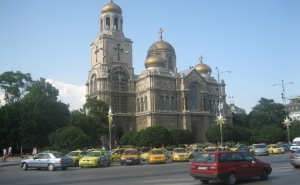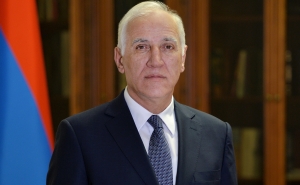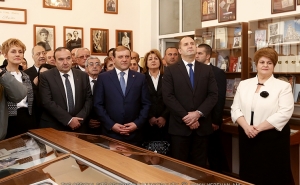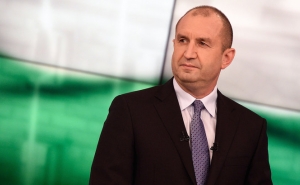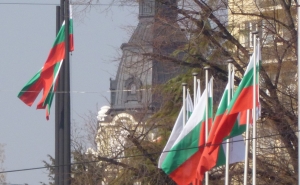Samuel: Armenian Tsar of Bulgaria

The history of the Armenian community in Bulgaria dates back to the 5th century. During the Byzantine rule, many Armenians moved to the territory of Bulgaria. In the 9th century, Christianity was proclaimed in Bulgaria as the state religion by the efforts of the Byzantine-Armenian Empress, Theodora Mamikonyan, Noah's Ark writes.
In the years of 997-1018, Bulgaria was ruled by the Armenian royal dynasty of Kamitopuli (Komsadzag), originating from Armenians Nikola and Hripsime. It was a dynasty of Orthodox Armenians, which left a notable mark in the history of Bulgaria. The sons of the founder of the Armenian dynasty, David, Moses, Aaron and Samuel, ruled in different parts of the state, which included the territories of present Albania, Greece, Macedonia and Turkey.
Samuel was destined to become one of the most famous Bulgarian kings. He and his brother served in the Byzantine army, in the Armenian military unit. By the order of the Byzantine emperor they were transferred to Thrace to fight the Bulgarians. Seeing the cruelty towards the local residents, they rebelled against the emperor and went over to the side of the Bulgarians. From 971 he actually began to rule Bulgaria as a commander and co-ruler of Tsar Roman, the second son of Tsar Peter I. After the death of Tsar Roman, who fled from Byzantine captivity in 977, Samuel became the king of Bulgaria. In an effort to preserve the independence of his kingdom, he waged continuous wars with the Byzantine Empire. In the first years of his reign, Samuel managed to several times defeat the Byzantines and stop their attacks on their lands.
At the end of the 10th century, Bulgarian troops conquered the Serbian lands (Dukla Principality) and conducted a number of expeditions against Croats and Hungarians. After Byzantium regained the northeastern lands of Bulgaria, Samuel moved the capital to the territory of modern Macedonia. Originally, there was no specific capital, but eventually the city of Ohrid was designated as the capital. Samuel died of a heart attack on October 6, 1014, two months after the catastrophic defeat at the Battle of Claydion, and Bulgaria was completely conquered by the Byzantines four years later.
During the reign of Samuel, the Bulgarian kingdom occupied a large part of the Balkan Peninsula, with the exception of Thrace. Although the rule of Samuel marked the fall of the First Bulgarian Kingdom, he is considered a national hero in Bulgaria and Macedonia, Rutraveller writes.
Very little is known about the early years of Samuel. According to the historian Stepanos Asokhik, Samuel came from the Armenian province of Derzhan. The inscription of Samuel, found on a stone near the Prespa lake in Macedonia, as well as the data of John Skilitzi indicate that Samuel's father was Nicola (Nikogayos), and the mother was Hripsime. According to some sources, Nikola served as governor, and mother was the daughter of Armenian king Ashot II from the Royal dynasty of Bagratunis.
During his reign, Tsar Samuel, just like his father, moved thousands of Armenian families from different parts of Byzantium to Bulgaria. Among them were Armenian military commanders, Armenian-Chalcedonian spiritual leaders, many public figures.
During the reign of Samuel, many toponyms of Armenian names appeared in Bulgaria, some of which survived up to this day, for example: Armeno, Armenzi, Armenica, Armenio, Ermentzi, Armecio, etc.
According to the data of 2001, 10832 Armenians officially lived in Bulgaria, however, unofficial sources indicate a different figure, 28-32 thousand Armenians. According to the Armenian organizations of Bulgaria, today this number has grown and reaches 30 thousand. The largest community is concentrated in the city of Plovdiv, it includes both Catholic Bulgarians and Protestants who consider themselves the ancestors of Armenians.

-
 17:08
17:08The regular session of the Anti-corruption Policy Council takes place in Jermuk
-
 15:05
15:05The Prime Minister sends congratulatory messages to the supreme leader of Iran and the President of Iran
-
 11:11
11:11Armenia sends earthquake aid to Turkey
-
 10:43
10:43Commemoration of the Pontiff St. Sahak Partev
-
 09:16
09:16Some roads are closed and difficult to pass in Armenia
-
 19:55
19:55Phone conversation of the Foreign Minister of Armenia with the U.S. Assistant Secretary of State for European and Eurasian Affairs
-
 18:30
18:30Prime Minister Pashinyan and President Khachaturyan meet
-
 18:20
18:20Ararat Mirzoyan with Co-Chairman of the OSCE Minsk Group of France Brice Roquefeuil
-
 17:01
17:01Humans could land on Mars within 10 years, Musk predicts
-
 16:45
16:45France, US urge 'immediate' end to Nagorno Karabakh blockade
-
 16:01
16:01Blockaded Nagorno Karabakh launches fundraiser to support quake-hit Syria
-
 15:59
15:59Earthquake death toll in Turkey rises to 18,342
-
 15:43
15:43Ararat Mirzoyan Held a Telephone Conversation with Sergey Lavrov
-
 15:06
15:06French president rules out fighter jet supplies to Ukraine in near future
-
 14:47
14:475 Day Weather Forecast in Armenia
-
 14:44
14:44President Vahagn Khachaturyan wrote a note in the book of condolences opened in the Embassy of Syria in Armenia
-
 14:20
14:20Azerbaijan’s provocations impede establishment of peace and stability – Armenian FM tells Russian Co-Chair of OSCE MG
-
 12:57
12:57France representation to OSCE: Paris calls on Azerbaijan to restore freedom of movement through Lachin corridor
-
 11:40
11:40Command of Kosovo forces highly appreciated preparation of Armenian peacekeepers
-
 10:16
10:16The United States withdrew from sanctions against Syria for six months the provision of assistance after the earthquake
day
week
month
Humidity: %
Wind: km/h


